Cooch Behar – I first heard about this place when I was reading a story on Maharani Gayatri Devi of Jaipur. She came from this place. This was pre-google days, and I assumed it to be a part of modern-day Bihar. Well, I was not too off the mark, Cooch Behar belongs to West Bengal at the edge where it touches Assam. The chicken’s neck that connects North-East India to the rest of India is this district. Unless you are flying, you can not reach North East India, without passing through the district.

I also heard tales of kings of Cooch Behar who would bet their lands in the game of dice. Does that remind you of Mahabharat – it reminded me of it. So, during our Sikkim Bengal trip earlier this year, we headed to the heritage town. We wanted to explore this land of beautiful women, a land sandwiched between Bhutan and Bangladesh, and a city that is known for its lovely palace.
Places to visit in Cooch Behar
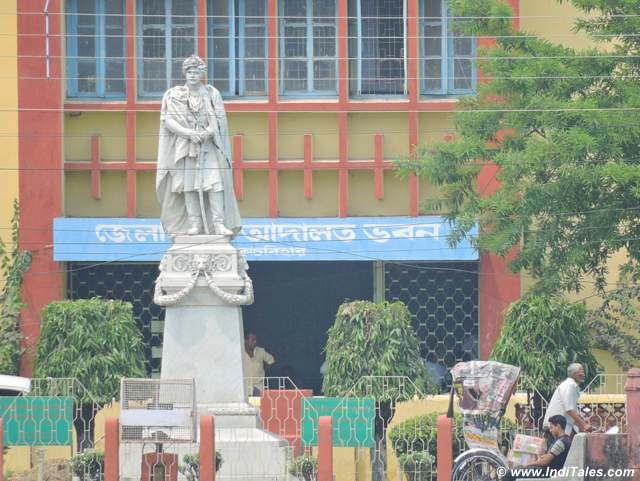
History of Cooch Behar
The history of the region goes back to pre-historic days. It has references in epics like Ramayan and Mahabharat. It was then a part of the Kamarupa region of the Pragjyotisha kingdom that extends up to the current day of Guwahati. Gupta Era pillars mention Kamrup in 4th CE. It was ruled by Guptas and Palas in the known history until it briefly came under Muslims towards the end of 15th CE. It was called Kamta then. Post this the Rajbongshi or Koch dynasty started establishing itself in the region and various kings of this dynasty can be traced till Indian independence.
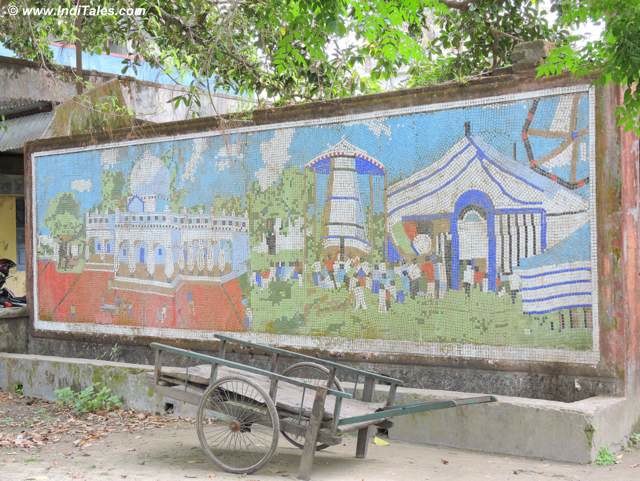
After an attack by Bhutan, a treaty was signed with the East India Company in mid-18th CE. Peace prevailed after this. In 1949, the princely state of Coch Behar merged with India and became a district of the state of West Bengal in 1950. In 1863, King Nripendra Narayan ascended the throne while still an infant. It was during his time that the Cooch Behar as it stands today would take shape. His most famous legacy would be Cooch Behar Palace which is probably the most majestic of Indian palaces though entirely European in character.
Maharani Gayatri Devi was the grand daughter of Nripendra Narayana
Cooch Behar Palace or Rajbari

Built in 1887 this lovely palace in red is locally called Rajbari or simply the home of the royal family. It is a must-see in the heritage town. Elegance is the first word that comes to my mind when I think of vast sprawling lawns surrounding the spread out of a structure in red. You realize it’s almost 400 feet in length only when you walk towards it. It looks small from the entrance gate but when you take that long walk through the lawns, passing by the small lakes you realize its real size.
Cooch Behar Palace is also called Victor Jubilee Palace

The right side of the palace building is broader than its left side – giving symmetry an obvious miss. A metal dome sits proudly above the building. If you look at the drum on which it stands, you will see the arched windows on it. This dome is visible from anywhere in the city. You can never get lost – just look for the towering dome. The palace has two stories but it looks taller, probably because of the tall dome.
Cooch Behar Palace was modelled on Buchingham palace of England

Museum
There is a museum inside the palace, which is closed on Fridays. As luck would have it, I was there on a Friday so I missed the museum. I was told that most of the items in the palace were stolen and are lost forever. My friends who visited this palace in their childhood were surprised to see the beautiful avatar of the palace when I posted the picture on my social media. Guess, some credit goes to ASI for maintaining the palace.

Since I could not enter the museum, I saw this beautiful doorknob in brass. I just tried to visualize the interiors.
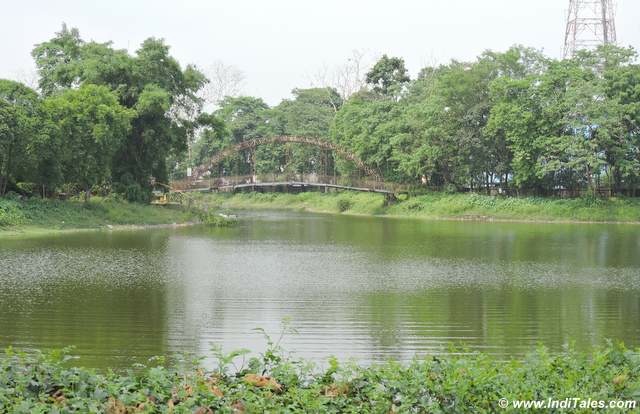
We walked around the palace and the backside of the palace was as beautiful if not more.

A Chat wala has very creatively placed his shop across the wall of the palace. By the time you walk around the palace, you are thirsty and probably craving a snack. He is perfectly positioned to serve you at this moment. Talk about grassroots innovations.
Temples of Cooch Behar

Any ancient town in India cannot be without temples that hold its cultural past intact. The historical town has many temples, but these are the ones I visited:
Madan Mohan Bari

The Madan Mohan Temple in pristine white has unique architecture. It has a circular dome in the middle and three different rooms in a straight line housing three different temples. The temple stands in the middle of manicured lawns. When you walk around the lawns you see the variety of sculptures scattered around. The entrance to the temple is built like a fort entrance with a Naqarkhana-like structure on top. Being in white it looks beautiful.

The main deity at Madan Mohan temple is Krishna. A brass idol of Krishna playing the flute dressed in yellow clothes and surrounded by yellow marigolds is the center of attraction. The royal family used to preside over all the rituals of this temple. Now, I am told the district commissioner performs this duty as none of the royal family members lives here anymore.

I was at the temple around mid-morning and we could see devotees sitting in the corridor and singing bhajans or devotional songs.

The temple on the right belongs to Kali – the fierce goddess that I so associate with Bengal. The third temple has two images of Bhavani Devi & Tara Devi. There is another smaller temple dedicated to Mahishasurmardini.
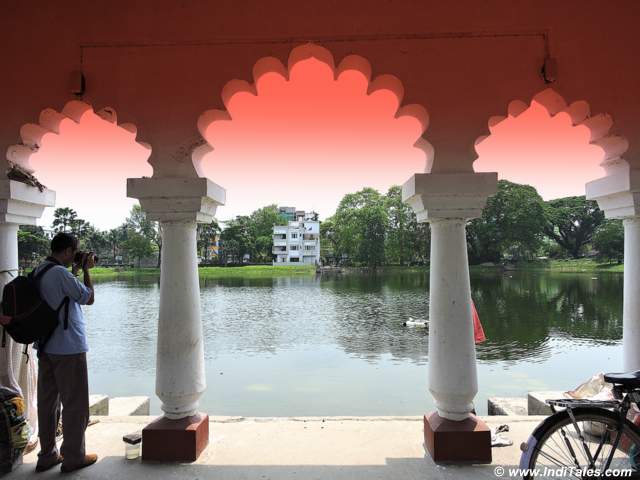
Opposite the temple is a small tank with an arched pavilion around it.
Madan Mohan temple was also built by King Nripendra Narayana
Ras yatra is a festival that is celebrated with fervor in this temple on Kartik Purnima i.e. 15 days after the festival of Diwali. This means that it coincides with the festival of Dev Deepawali or Tripurari Purnima which is celebrated across the country.
Baneswar Shiva Temple
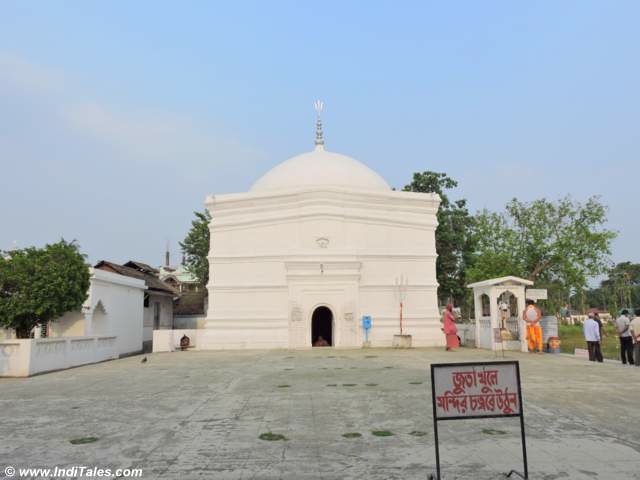
Situated a bit to the north of the town, Baneswar Shiva temple is situated next to a pond.
A simple temple in white houses the ancient Shivalinga. The peculiarity of this temple is that the Shivalinga is located about 10-12 feet below ground level. So, when you enter the temple, you have to go down a few steps to see the Shivalinga. I assume the level of the rest of the town may have gone up with layers of buildings, while the linga remained where it was installed.
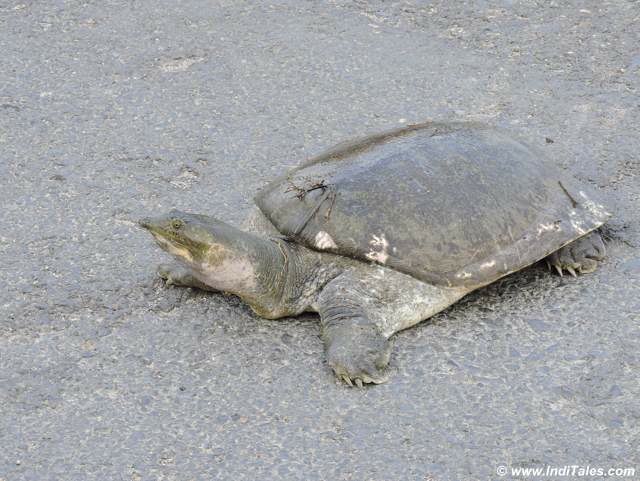
The pond next to the Baneswar temple has a large number of tortoises. In fact, not too far from the temple, we saw some tortoises taking a leisurely walk on the road.
Sagar Dighi

The Sagar Dighi is a large tank in the middle of the town. We walked around this tank to get a feel of the town. This is what we saw:

A few colonial-era buildings are now converted into government offices. Most of them are in red colors almost like the Colonial Calcutta ones.

At regular intervals, there are statues of Bengali men – the names are all written in Bengali so I could not make out much. Of course, there was Gurudev Rabindranath Tagore.
The statue of the architect of modern Cooch Behar – Raja Nripendra Narayana is seen on one edge of the Sagar Dighi.

Sagar Dighi – the quiet square lake with ghat-like stairs was quiet and serene. It looks like the city revolves around her and she is a silent witness to everything that happens here. Birds flew across, ducks swam at the corners and trees provided the much-needed shade.
We saw wall murals made with mini ceramic tiles or mosaics. Look at this mural that depicts all elements of the city with such elegance. Another one depicted the Baul singers of Bengal.
Travel Tips

- It is well-linked through Indian Railways from most major stations.
- There is a ticket to visit the Madan Mohan temple and a ticket for the camera. Priests are rude and very unwelcoming.
- You can hire a rickshaw to go around the city. We took a Taxi from Jaldapara and did a morning-evening trip.
- You can easily do the major parts of the city in a day.
- On the way back you can drive through the thick Chilapata forest.
I found the place a perfect mix of nature, culture, heritage, and spirituality.
Recommend you read the following travel blog posts on places to visit in Bengal.
Kolkata – Colonial Calcutta Heritage Walk
Darjeeling Himalayan Railways – A Living Dream
Calcutta – Melting Pot of Cultures Walk






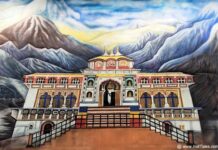

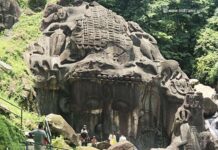





Hi, I love the photographs very much. The palace has the power to get back our mind to olden days of kingdom era. I like to see the old culture and stylish structural fort. My next trip is towards Nepal and when i come back i will see the cooch behar. Thank you for letting me know a new place
Hi Selvakumar, Glad that the post reminded you of old palaces of India. Do share your views on it when you have visited Cooch Behar.
Only if I knew of this place while I was in West Bengal for 4 years…I would have definitely visited it. Anyways, I will bucket it for my next visit. Lovely post, and how you came to know about it is an example of what all books can bring to us!
Books and my readers are two sources of my discovery of new places Neha. So, if you know of a hidden corner, do share with us.
Will definitely do Anuradhaji 🙂 . We are traveling through Kolkata in November, where we have some 5-6 hours at hand. We are looking forward to plan a tiny itinerary for ourselves. What would be your recommendation?
Do the Kolkata walks – the colonial Calcutta or the Melting Pot of Cultures – in 5-6 hours you can potentially manage one of them. Of course you must enjoy some Bengali food too.
My own grandmother Aline de Veria who married my grandfather Geoffrey Rose wrote a book called Bengal Dacoits and Tigers with the then Maharani of Cooch Behar….the legendary Ma mother of Gayatri Devi whose name was Ayesha; Ma Cooch Behar was the only daughter of the legendary and revered Maharajah of Baroda. My Grandmother did the illustrations too. She is buried at Asansol in West Bengal having died young tragically from pneumonia. I would love to visit and am now inspired to try and make it happen.
Wow, Aline! I would love to hear the whole story and you should probably submit your story to India Memory Project – they are documenting such stories. Do you have the copy of the book?
I can only imagine how much you would want to visit Cooch Behar. Hope you get to go there soon enough.
Loved your article. Couple of points to mention
1.Cooch Behar District is not in the chicken neck area. Chicken Neck lies in Jalpaiguri district.
2.The “Chaat” you referred is actually called “Ghotigaram” in Bengal. It is a portmanteau of words “Ghoti” i.e a small, bulbuous container and “Garam” i.e served hot in Bangla.
Thanks, Amitava for adding to the article on Cooch Behar. I was not aware of the word ‘Ghotigaram’ – glad that I now know it.
Cooch Behar is nice place in bengal and it’s your amazing trip ..Thanks for share very informative article
west Bengal such a nice place thanks for the post madam.
Glad you liked the post Sumit.
Since we, Jaipurites so attached to anything pertaining to Maharani Gayatri Devi… feel like visiting the place. This informative article made great reading!!!!
I totally understand Manoj ji. Maybe on this pretense, you will discover the state of Bengal. Thank you for appreciating. Stay connected.
Your blog (specially,the photos) took me down the memory lane for I once spent a brief period (1994 t0 1996) of my life at Cooch-Behar.i still miss the laid back life of the place.It is undoubtedly the best town in West Bengal and a great place to be.
Ajay ji, feedback like this makes me feel that the blog is serving a purpose. Sometimes it makes people plan a trip to a place and sometimes it takes them down the memory lane. I am so happy that you could re-live your Cooch Behar dats through this blog post. Do tell us more about the city when you can.
I agree this is a beauticul city of Bengal although I would say Bishnupur gives it a tough competition.
I’m really impressed at the Eurocentric palace, especially the long lawns and expansive gardens. Any reasons why the ruler decided to adopt that style?
Dan, this was the time when British ruled India and their influence can be seen on many buildings across the country.